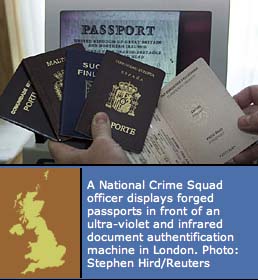Women and children are sexually exploited; men are subjected to forced labor.
Type: Destination Country
Background
Immigration policies, specifically those dealing with asylum, have been at the center of heated debate in the U.K. for the past several years. The rise of asylum applicants at the end of the 1980s continuing through this past decade has led to policy changes and “get tough” laws. In June 2003 the Home Office, Britain’s department of internal affairs, published a report stating that these tough measures have had unintended consequences: They have led to a boost in human smuggling and trafficking, because many refugees are forced to use illegal means of entry.
Victims
Up to 15,000 women are trafficked annually into the U.K. for the purpose of sexual exploitation. Women from Eastern Europe, particularly from Albania, Romania, Bulgaria, and Lithuania are brought to the U.K. for the sex trade. These victims — like many other women around the world trafficked for the sex trade — are kidnapped or lured with promises of legitimate jobs. Albanian women are at the top of the list of Eastern European women trafficked to the U.K., and the situation may get even worse: An Albanian government official recently announced that organized criminal gangs from the country are specifically targeting Britain to traffic women and children for prostitution.
Women from East Asia, especially Thailand and China, are also trafficked into the country. A 1998 Home Office study revealed that of the 71 trafficked women caught by the police 35 were from East Asia, most of them from Thailand. Hong Kong triads and Chinese crime syndicates bring in women as tourists or use forged travel documents. These women, under the threat of violence, are forced to work long hours — 12- to 14-hour shifts, receiving little or none of the money the men pay.
Women are not the only victims. A 2003 UNICEF study determined that the U.K. has become susceptible to child trafficking. Children from Africa are brought to Britain for domestic servitude or sexual exploitation. In recent months, African children brought to the country for slave labor and sexual exploitation were discovered during an organized crime raid, while others were discovered after they were abandoned by a suspected criminal gang.
While women and children are trafficked primarily for sexual exploitation, men are exploited in sweatshops or in the agricultural industry. The 58 Chinese men who died in June 2000 while being smuggled into Dover, if they had survived, would have more than likely been forced into slave labor to pay their debt to their smugglers.
Counter-Trafficking Efforts
In January 2002 the U.K. passed a stop-gap measure under the Nationality, Immigration and Asylum Act that makes trafficking for prostitution a criminal offense with a maximum penalty of 14 years in prison. The Sexual Offenses Bill expected to pass later this year will replace the stop-gap measure. This new bill comprehensively reforms and modernizes the law on sexual exploitation. Although watch groups welcome this new law, they point to the lack of legislation for labor exploitation.
The government has created specific guidelines for law enforcement officials to help them identify victims from illegal migrants as well as operating procedures to prevent intimidation and harassment of victims. These guidelines aims to prevent the practice of returning trafficked persons to their homeland, where they could be subjected to reprisals or re-trafficked back to the U.K.
For those who are properly identified as trafficking victims, the U.K. has sponsored victim support initiatives. In March 2003 the U.K. launched a program run by a domestic violence NGO that helps trafficked women receive safe accommodation, access to health care, as well as legal advice — all support services outlined in the UN protocol for trafficking.
- Previous: United Arab Emirates



